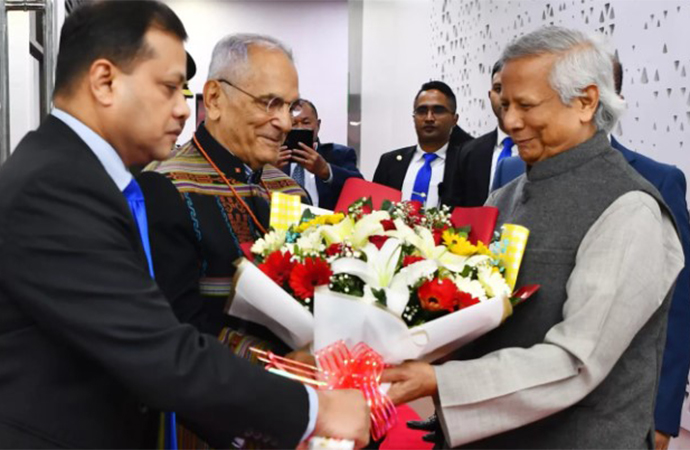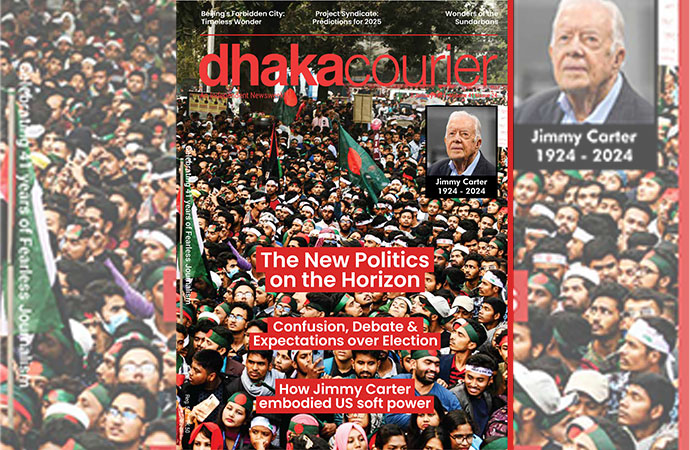Column

The reputable Dhaka-based literary club 'The Reading Circle'(TRC) organized a Webinar late June marking the twentieth anniversary of the publication of the seminal work of the Pulitzer-prize winning author Jared Diamond, "Guns, Germs and Steel: The Fates of Human Societies". This is an immensely well documented transdisciplinary non-fiction by this eclectic writer. The event was moderated by the Chair of TRC Professor Niaz Zaman, whose occasional meaningful interjections enriched the deliberations. As usual, there was this clutch of participants drawn from Bangladesh and abroad. Insightful presentations were made by Shireen Mainuddin, Nusrat Huq, Shahruk Rahman, Sanjeeda Hossain, and Razia Sultana Khan. Ás on earlier occasions, I joined the event from Singapore. This article is based on the remarks I made at the discussion.
To my mind, there are two ways to look at the volume; one, as literature or two, as a social-science thesis. I decided to focus on the social science aspect. I thought my long diplomatic career spanning across continents, the consequent exposure to varied cultures and current association with the academia particularly in the sphere of global power-play adequately equipped me to view the narrative from this perspective.
Now on the substance of the discussion. Earlier, major western philosophers had not fought shy of racism. Take Friedrich Nietzche, for instance. He clearly believed the appropriate genome-mix could create the "Ubermench" or Superman, the earthly embodiment of the highest values of a superior being: Or Emmanuel Kant. He had said "The Chinese, Indians, Africans, and indigenous peoples of America are congenitally incapable of philosophy", and sincerely believed that "humanity achieved its greatest perfection in the white race". By contemporary standards, these observations are hugely politically incorrect.
Now, as we all know that one's hypothesis must be put to test by use of data and arguments, and then if one can pull off a logically deduced conclusion, QED (Quod Erat Demonstrandum), it becomes a thesis. Just as one does with proving an assertion in Euclidian theorem in Geometry. Diamond starts off in a politically correct fashion. His hypothesis is that western progress both civilizational and also military, is owed not to race or genomes, but mainly to geography, and environment. He thought the Europeans were essentially lucky in two respects: first, they had unusually domesticable plants and animal species, and second a latitudinal east -west rather than a longitudinal north -south orientation so that a species in one part was at home in another. These advantages aided their successes in peace and war. So, history was the product of geographical and environmental determinism (contrasting Karl Marx's ''economic determinism''). Once geography is fixed, all else is inevitable, and fall into place.
Diamond fills his study with enormous data. In fact, the reader is wont to lose the woods for the trees. But one gets the impression he does not quite pull off the QED. For instance, despite the commonality of space, latitudinal linkages, food, and climate could not prevent great historic conflicts like the world wars, American civil war or the bloody Roman conquest of Gaul. Also, if it is all about being first in setting up farming the Chinese should be the world's pre-eminent civilization. He later admits it is not just geography, but there are other causes. But by doing so he diffuses his own thesis, thereby weakening it. I would therefore be circumspect about viewing all historic causation through his lens.
There may be those who will argue, he may still prove right, but not in the way he would have liked. Look at the Corona virus. It emanated from China, the west reacted abysmally, and its economy crumbled. China and the East succeed in handling the crisis better, China most certainly so, and forged ahead. So, Diamond's analyses can be said to have become so accurate that he might be himself unable to believe his own conclusions!
In fact, there are more serious arguments pointing in that direction, that is, towards the rise of China and the east. The famous British historian Niall Ferguson speaks of six powerful concepts that drove the Western progress which the Rest lacked: These are: competition, science, the rule of law, modern medicine, consumerism, and the Protestant work ethic. He called it, in today's digital jargon, the "KILLER APPS" that allowed the West to go ahead of the Rest. But now, he warns, the days of western predominance appear numbered. The Rest, particularly Asia and China, have downloaded the ''Killer Apps'' the West once monopolized, as the West literally seems to have lost faith in itself.
The overall sense of the debate was that while the tome was painstakingly researched and powerfully argued, the reader would need to be circumspect about viewing all historic causation through Diamond's lens.
From my perch in Singapore, I feel, I am at the confluence of the West and East. In this little Red Dot (as Singapore is often affectionately called by its citizens) cultures of the west and east are fused. It is largely a function of globalization. The western protestant work-ethic exists side by side with oriental Confucian values, shaping behaviour- pattern that are not dissimilar. Things are just called differently. One is reminded of an Ogden Nash whimsy, expressed in a witty doggerel: It goes:
I give you now, Professor Twist,
A conscientious- scientist
Trustees exclaimed "He never bungles""
And sent him off to distant jungles.
Camped on a tropic river-side,
One day he misses his lovely bride,
She had, the guide informed him later,
Been eaten by an alligator.
Professor Twist could not but smile,
"You mean", he said "a crocodile"?
Dr Iftekhar Ahmed Chowdhury is the Honorary Fellow at the Institute of South Asia Studies, NUS. He is a former Foreign Advisor (Foreign Minister) of Bangladesh and President and Distinguished Fellow of Cosmos Foundation. The views addressed in the article are his own. He can be reached at: isasiac @nus.edu.sg

























Leave a Comment
Recent Posts
EC will ensure everyone's voti ...
Chief Election Commissioner (CEC) AMM Nasir Uddin on Sunday said the E ...
The Forbidden City: A timeless ...
For foreigners exploring Beijing, the Forbidden City stands as a magni ...
2025: Moin, Mamun elected DCAB president, general se ..
Dhaka's ties with Delhi won’t get stuck on single is ..
Old state, new society
A foreign policy imperative for the year ahead